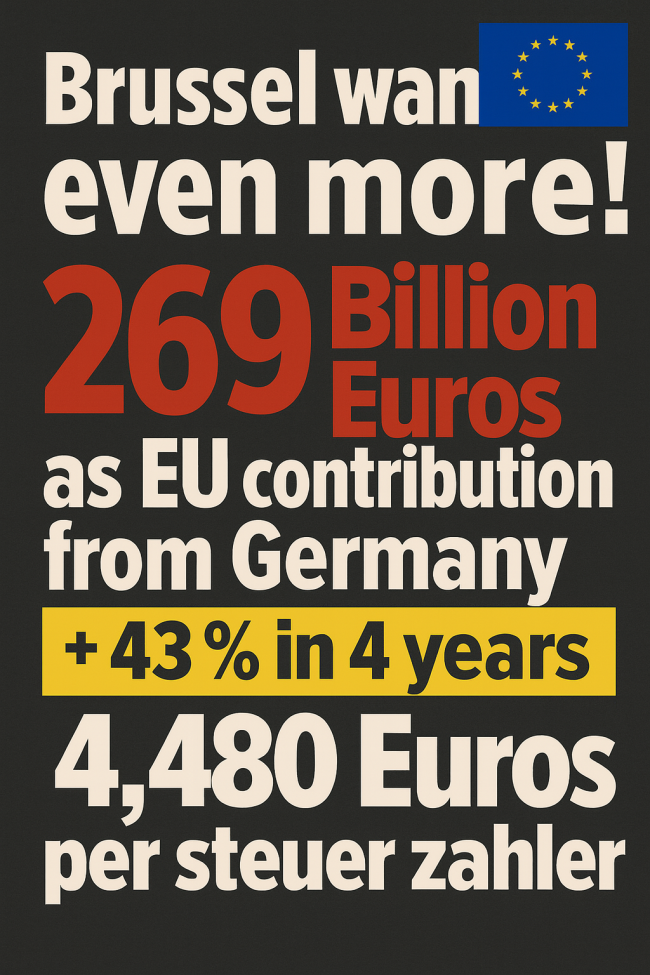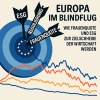
Germany to Pay 269 Billion Euros as EU Contribution – 43 Percent More for Brussels

Germany's growing billion-euro burden
Germany currently finances almost a quarter (23.6 percent) of the European Union (EU) budget. In concrete terms, this corresponds to around 47 billion euros per year. Within a legislative period (the period between two federal elections, normally four years), Germany's contribution totals around 188 billion euros. However, the European Commission's plans to drastically increase the EU budget could massively increase this burden.
Germany pays such a high share because it is the strongest economy within the current 27 EU member states and is therefore the largest net contributor. Other significant net contributors are France, the Netherlands, and Sweden, but Germany's contribution is by far the highest.
Planned increase to 2 trillion euros
For the years 2028 to 2034, the European Commission – a central EU body whose members are not directly elected by citizens – is proposing a so-called Multiannual Financial Framework (MFF, the EU's long-term financial plan) totaling 2 trillion euros (2,000 billion euros). This corresponds to an increase in the annual EU budget of 43 percent, from currently around 199 billion euros to 285 billion euros per year in the future.
Consequences for the German contribution
If Germany were to maintain its current share of 23.6 percent, the annual German contribution would rise from the current 47 billion euros to around 67.3 billion euros. Over a four-year legislative period, this would amount to a total of around 269.2 billion euros—an absolute additional burden of over 81 billion euros or 43 percent.
Burden per capita and taxpayer
The burden on the population would increase significantly. Germany has around 84 million inhabitants. Currently, every German citizen pays around 560 euros per year to the EU budget. With the planned increase, this amount would rise to around 800 euros. Over four years, this would amount to 3,200 euros per person instead of the current 2,240 euros – an additional burden of 960 euros.
The approximately 42 million German taxpayers would be even more severely affected. They currently pay an average of €1,120 per year to the EU. After the increase, their contribution would rise to around €1,600 per year, or a total of €6,400 within four years – an increase of €1,920 per taxpayer.
Comparison with the German federal budget
To illustrate the scale of this increase, Germany's total federal budget currently amounts to around 477 billion euros per year. Germany's current EU contribution thus accounts for around 9.8 percent of the total federal budget. The planned new EU contribution would amount to around 14.1 percent of the current federal budget – a significant and noticeable increase.
Relationship to German gross domestic product (GDP)
Germany's gross domestic product (GDP, total value of all goods and services) amounted to around 4,500 billion euros in 2024. The current EU contribution of 47 billion euros thus corresponds to approximately 1.04 percent of GDP. The planned increase to 67.3 billion euros would correspond to approximately 1.50 percent of German GDP, which represents a significant increase in the economic burden.
Return flows to Germany
In 2022, Germany paid around €33.5 billion into the EU budget and received around €13.2 billion back. Germany is therefore a net contributor (it pays more than it gets back) and received only 39 percent of its contributions back. If Germany's contribution were to rise to 67.3 billion euros without an increase in returns, Germany would become an even larger net contributor: the net contribution rate would then be around 80 percent, as only 13.2 billion euros would be returned and the net loss would rise to around 54.1 billion euros per year.
Who receives EU funds?
EU funds flow mainly to countries that are economically weaker and therefore considered net recipients. Examples include Poland, Hungary, Romania, Greece, Portugal, and Spain. For these countries, EU membership represents a clear net financial gain. Germany thus indirectly finances numerous projects in these countries without receiving corresponding repayments to the same extent.
Effects of a possible enlargement to include Ukraine and Georgia
If Ukraine and Georgia were to become EU members, this would probably further increase Germany's financial burden, as both countries are among the economically weaker states in Europe. It can be assumed that these countries would receive significantly more financial resources from the EU budget than they could contribute. This would further strengthen Germany's role as a net contributor and significantly increase the pressure on the EU budget and its financing.
Political challenges and alternatives
This enormous increase in the financial burden would only be politically feasible if clear advantages for Germany were apparent. These could include more investment in security and defense, cross-border industrial projects, migration management, or targeted promotion of innovation and technology.
At the same time, alternative sources of financing are currently being discussed, such as new EU own resources such as plastic taxes or CO₂ tariffs, in order to partially relieve the burden on member contributions.
Conclusion
An increase in the EU budget to €2 trillion would pose an immense financial challenge for Germany. The contribution per inhabitant and taxpayer would rise significantly, as would the share of the federal budget and German GDP. Without substantial returns or new sources of financing, Germany's role as a net contributor could become even more dramatic – a key political issue in the coming years.
EU Commission – Why Europe's central government functions like the Politburo of the GDR or Beijing
An institution without direct democratic legitimacy
The European Commission is the central executive body of the European Union (EU). However, it has one crucial weakness: its members, known as EU commissioners, are not directly elected by the citizens. Instead, they are appointed by the national governments of the member states, which makes the EU Commission structurally similar to the Politburo of the former GDR (German Democratic Republic) or central power organs such as the Beijing government in China – all of which are bodies without direct democratic legitimacy through free elections.
Composition of the EU Commission and German influence
The EU Commission currently consists of 27 commissioners, with each EU member state appointing exactly one commissioner. This means that Germany, as the most populous country in Europe with over 84 million inhabitants, has only one commissioner. In percentage terms, this corresponds to only 3.7 percent of the entire Commission, even though Germany contributes around 23.6 percent of the EU budget.
Decision-making power without direct citizen control
The EU Commission has considerable powers, including the right to propose new EU laws, monitor member states' compliance with existing laws, and manage the EU budget. Its decisions directly affect the daily lives of around 450 million Europeans, without the Commission being directly accountable to citizens.
The European Parliament, which is directly elected by the citizens, has a right to be consulted, but the actual executive power lies firmly in the hands of the Commission. This creates a significant democratic deficit, which is increasingly giving rise to criticism and incomprehension.
Comparison with the GDR and Beijing
Like the Politburo of the GDR or central government bodies in China, the EU Commission makes decisions largely independently of direct democratic control. Although the EU and authoritarian systems differ fundamentally in their political and social structures, there are striking parallels in terms of the legitimacy of their executive bodies: important political and economic decisions are made by a small circle of decision-makers who are not directly elected.
Consequences for Germany and Europe
This situation means that Germany is under heavy financial strain but has only minimal influence on executive decisions within the EU. At the same time, skepticism toward the EU is growing among sections of the population who feel they are governed by a distant bureaucracy.
Conclusion: the need for democratic reform
The EU Commission, in its current form and composition, contributes significantly to the perception of a democratic deficit.
In order to secure long-term trust in the EU institutions and strengthen democratic legitimacy, it would be necessary to consider fundamental reforms – such as direct elections for Commission members or greater control and influence by the directly elected European Parliament. This is the only way to prevent the EU Commission from permanently appearing as a centralised politburo that governs far removed from its citizens.









